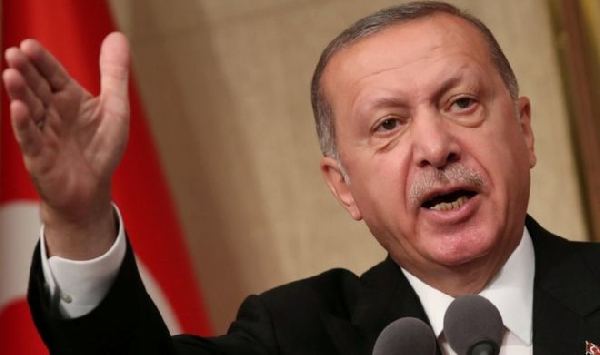Turkey’s President Recep Tayyip Erdogan has said his country will boycott US electronic products, after Washington imposed punitive sanctions on Ankara.
“If [the US] has the iPhone, there’s Samsung on the other side,” Mr Erdogan said, referring to Apple and its South Korean competitor.
The US doubled tariffs last week over Turkey’s refusal to extradite a US pastor who is imprisoned there.
Turkey’s weakened currency, the lira, plunged by a full 20% in response.
President Erdogan said Turkey was taking measures to stabilise the economy, and should not “give in to the enemy” by investing in foreign currencies.
Russia’s Foreign Minister Sergei Lavrov, who is visiting Ankara, branded the US sanctions an illegitimate policy at a news conference on Tuesday. He accused the US of seeking an unfair competitive advantage in global trade.
What’s happening to Turkey’s currency?
Since January, the Turkish lira has lost more than 34% of its value against the dollar, pushing up the price of everyday items.
Mr Erdogan has presided over soaring inflation and borrowing levels, but insists the lira’s plight is the result of a “campaign” led by foreign powers.
In a televised speech on Friday, he called on Turkish citizens to exchange foreign currency and gold for lira, calling it an “economic war”.
Now it appears there may be a small respite for the flailing currency, which has gained slightly in value after days of dramatic falls.
Turkey’s central bank has promised to provide banks with liquidity. The country’s finance minister – who is also Mr Erdogan’s son-in-law – will seek to reassure around 1,000 international investors in a teleconference scheduled for Thursday.
The BBC Turkey correspondent Mark Lowen says Mr Erdogan’s boycott could stoke tensions with the US further – and Turks are waiting nervously for Mr Trump’s response.
Why all this fuss over a pastor?
President Erdogan has accused the US of trying to “bring Turkey to its knees through threats over a pastor”.
But the US insists Andrew Brunson, a long-time Turkish resident who ran the tiny Izmir Resurrection Church, is “a victim of unfair and unjust detention”.
An evangelical from North Carolina, he has been held in Turkey for nearly two years over alleged links to the outlawed Kurdistan Workers Party and the Gulenist movement, which Turkey blames for a failed coup in 2016.
White House press secretary Sarah Sanders said the US had seen “no evidence that Pastor Brunson has done anything wrong”.
Mr Brunson has denied charges of espionage, but faces up to 35 years in jail if found guilty.
What’s the impact internationally?
The ruckus between Turkey and the US has impacted on other countries’ currencies, including the Indian rupee, as investors fear the lira’s wobbles could spread to developing nations.
India’s government urged people not to panic on Tuesday after the rupee slid to an all-time low against the dollar.
Russia, Brazil, Argentina, South Africa and Mexico have also seen their currencies fall over the last week.








